On the 23rd November 2019, The National Archives and Bishopsgate Institute took over the Royal Vauxhall Tavern for an afternoon of frivolity. It was an opportunity for us to reflect on how same-sex couples met in the past. The reason? We wanted to celebrate LGBTQ+ heritage, taking ourselves out of the archive to show the relevance of our records to audiences that may not naturally come to us.
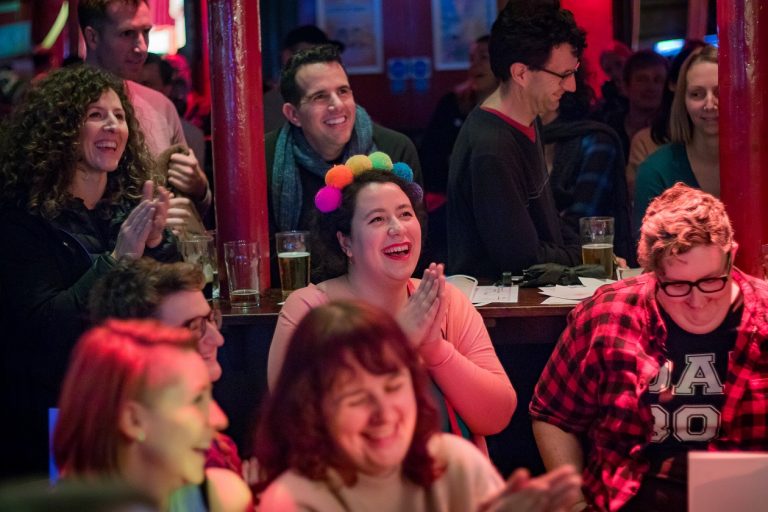
Photograph of the final event Classified: A performance of queer dating ads inspired by archives held at the Royal Vauxhall Tavern on 23 November 2019. Joel Ryder Media Ltd.
As part of the Being Human Festival, the event sought to ask three key questions:
- In an era when the law criminalised your love, how was it possible to meet members of the same sex?
- What can archives reveal about how queer networks and communication have evolved over the last hundred years?
- And if Grindr was invented a 100 years ago, what might it have looked like?
These questions really represented the tone of the event; it was humorous while poignant.
Classified adverts in The Link
Our research for the event was driven by a fantastic publication called The Link. The Link was a ‘lonely-hearts’ publication from the early 20th century, which strove to provide connections – connections for love, lust and companionship. Through this publication men used the coded and suggestive language of classified adverts to meet other men, and some women to meet other women. This can be inferred from some of the coded language of this publication: words like ‘artistic’, ‘bohemian’ and ‘unconventional’.
Business Girl (London, S. E.) wishes to meet jolly girl chum, 25-30, for evenings and weekends. South London district.
W. C. (London, N), 27, desires companion in sidecar for inexpensive week’s holiday anywhere, any time, unconventional, broad-minded, Bohemian. Photo if possible, returnable. All letters answered.
Almost immediately, my mind was drawn to modern dating apps. What I saw in The Link made me reflect on how much has changed in the past 100 years. But also, at the same time, how little has changed when it comes to looking for love and relationships.
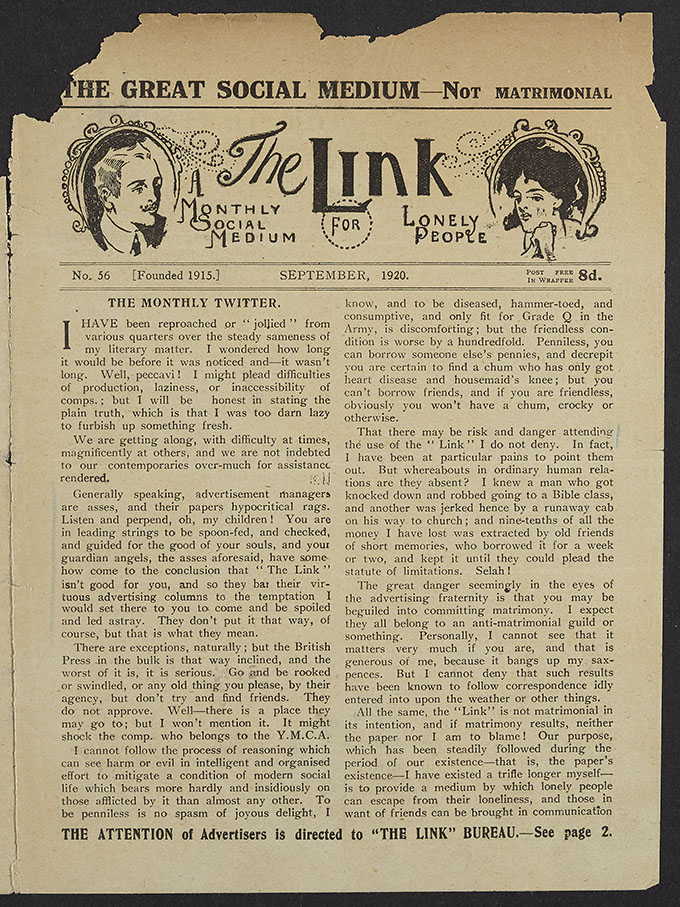
The Link, A Monthly Social Medium for Lonely People, No. 56. September 1920. Catalogue ref: MEPO 3/283
These records exist because in the 1920s same sex desire between men was deemed a criminal offence. The Link was often seized by the Metropolitan Police, which accounts for why the records reside within our collection. However, their pages reflect the fierce defiance of people who wished to live and love despite the law.
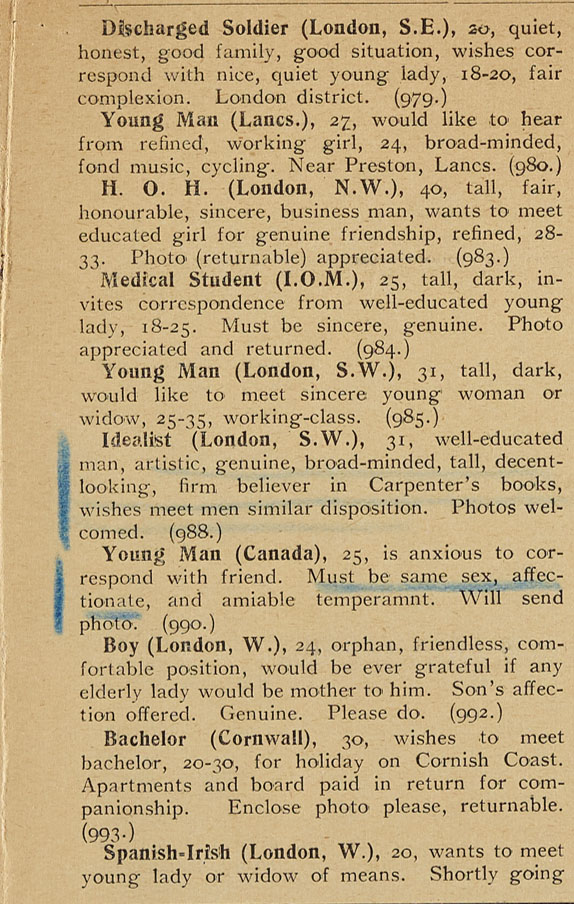
Sample list of classified adverts from issue No. 56 of The Link, September 1920, as underlined by R A Bennett. Catalogue ref: MEPO 3/283
Archive to event
This original research underpinned our project and included two research workshops that were open to the general public, providing an extra chance for people to actively engage with the archive material.
So what to do with this amazingly rich material?
Funding from the Being Human festival enabled us to be creative. After lots of conversations, planning and discussions, we developed an event that we felt best complimented the archival material and personal stories within. Many meetings were had with Tim Redfern (brilliant performer Timberlina) to fully explore the research and get the tone right.
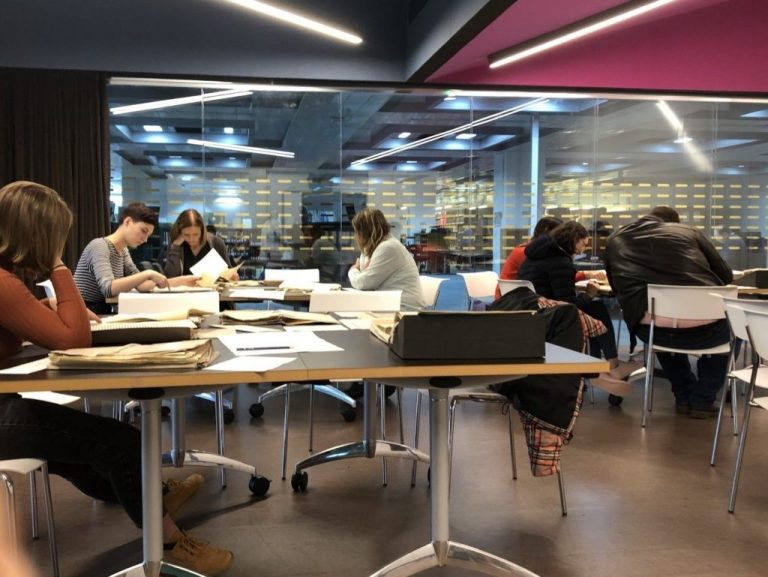
Photograph from an archival research event held at The National Archives on Saturday 12 October
Performing the archive
The resulting event on 23rd November at the Royal Vauxhall Tavern was a fantastic celebration and commemoration of queer lives in the past.
The stage was taken over by Timberlina, with Auntie Maureen as our resident DJ for the afternoon. Together, through performance and conversation, we followed the journey of personal adverts from the 1920s up to the present day. This relied on more contemporary classified adverts from our partner organisation, the Bishopsgate Archives. These more recent classified adverts, often still coded, proved equally fascinating and allowed us to examine the difference in adverts before and after partial decriminalisation of homosexuality in 1967.
There were three sections to the event:
- An on stage performance of classified adverts by Timberlina
- A chance to explore facsimile archive material, ask questions and listen to a queer playlist of music by Auntie Maureen
- An on stage chat between Rachel from Bishopsgate Archives, Timberlina and myself.
Using the 25 word format of The Link we also encouraged people to think about their own personal classified adverts: how might they use their own coded language to describe themselves and what they were looking for?
People engaged enthusiastically, writing their own (rather naughty) classified adverts in the 1920s style. The resulting examples were personal, revealing and often hilarious.
You can see more about the event in the short film below.
Many thanks to everyone who made this event happen and to those who attended. Watch out for future events. We would love to get our LGBTQ+ collections out of the archives again!
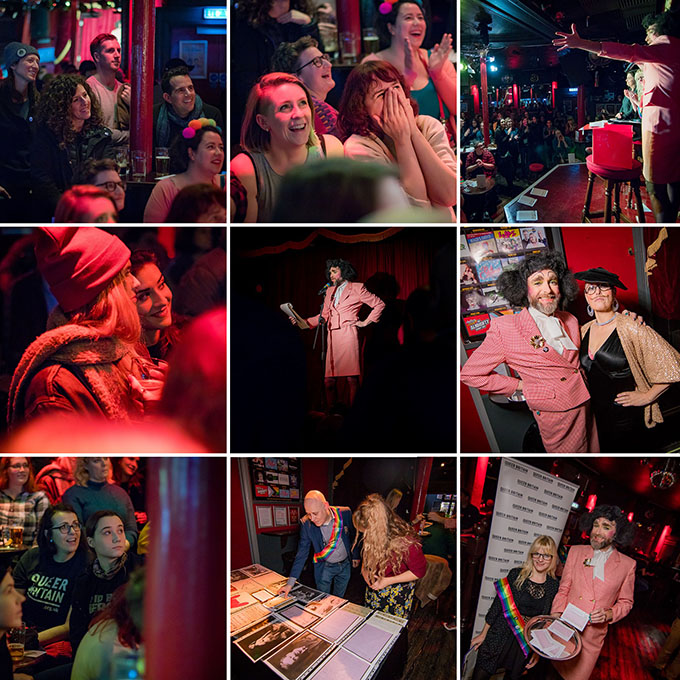
A selection of images from the final event ‘Classified: A performance of queer dating ads inspired by archives’ held at the Royal Vauxhall Tavern on 23 November 2019. Joel Ryder Media Ltd
You can find more about the research behind the project below: